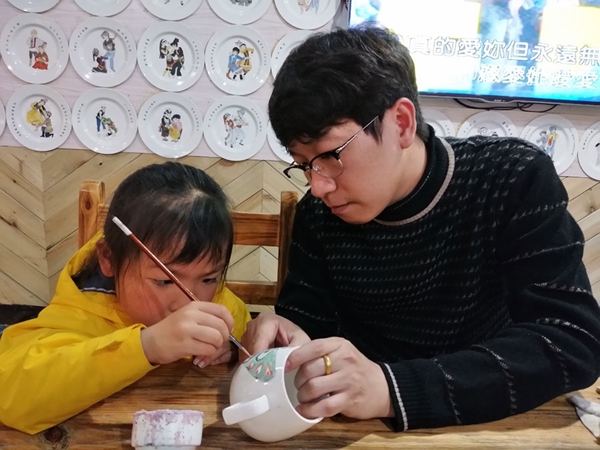Bringing the charms of china to tourists
 0 Comment(s)
0 Comment(s) Print
Print E-mail China Daily, July 4, 2019
E-mail China Daily, July 4, 2019

In one of the most popular tourist spots in the coastal city of Xiamen, in East China's Fujian province, a china painting store called 4928 Painting Hall in Zengcuo'an village was packed with visitors focused on painting white mugs, plates and vases.
Hou Yen-chih, the store's founder and owner, sat among them and occasionally gave the customers some guidance. It is his eighth year running a business in the Chinese mainland. Coming from Miaoli county in Taiwan, Hou took a chance in Xiamen by setting up a street stall and selling porcelain to passersby, after quitting his job as a manager at a listed technology company in Taiwan.
He came to Xiamen out of curiosity and expectation in 2011 - curiosity due to his little knowledge of the Chinese mainland market and expectation because he was told that he could earn more than 10,000 yuan ($1,450) a month. Hou's father, who ran his own business in Xiamen for 20 years, told him that a friend who sold porcelain at Xiamen's night market could earn that amount of money, which was pretty much the same amount Hou earned as a manager in Taiwan.
"After understanding the situation here, I was very interested in porcelain so I decided to start my own porcelain business," Hou said. "My thoughts were very simple at first, just to accumulate some money by running the street stall."
He rented a garage as a workshop and lived in a very old community. Apart from constantly working overtime, Hou also had to endure being separated from his wife and newborn daughter.
"I was only thinking of one thing. The market is huge here. If I didn't succeed and returned to Taiwan, others would think it was because of my lack of ability. I can't be a failure. I want to make my business better and bring my family over," he said.
Hence, Hou never stopped trying out different locations and marketing strategies, and figuring out his advantages in the market to attract more customers. After running the stall for a year, he gradually understood more about the market and began operating a wholesale porcelain factory.
However, running a standardized factory required more effort and it was far more difficult than running a street stall. Wishing to make his sales in a service-oriented way, Hou almost led the factory into bankruptcy in the second year.
"I was thinking in a Taiwan way. The management mindset that I had was not suitable for traditional porcelain wholesale, so I had to rack my brains to think about reform and innovation," he said.
In 2015, Hou paid a visit to Zengcuo'an village and was surprised by the number of people and bustling commercial atmosphere, prompting him to open a store for customers to create their own designs on the porcelain. As his store was located deep in the alleyway, Hou went to the village entrance every day and tried to convince tourists to come by telling them that the store was close to an ancient residence of the military department in the Ming Dynasty (1368-1644).
"It helped me build up a reputation among tourists, and thinking back now, I think it had a lot to do with the courage I gained when I was running the stall," he said.
With the sheer numbers of tourists traveling to Xiamen and Zengcuo'an village each year, more people began paying attention to his little store and Hou said it has gained more than 10,000 fans in the three years since it opened.
As an entrepreneur from Taiwan, Hou said he would like to thank the government for establishing preferential policies so that his wife and child can settle down with him in Xiamen and that his child can attend a local public school, solving his biggest problem as he runs his business in the mainland.
People might think that he is just a salesman selling china, but Hou said that his products actually carry stories, emotions, hopes and most importantly - love.
"The slogan of the store is called 'Love China'. The first meaning of the slogan is that I am Chinese, and I love china and china represents our history," he said. "The second meaning that I gave is a meaning of love to tell the country, and even the world, the message that this is 'Love China', a China full of love."





